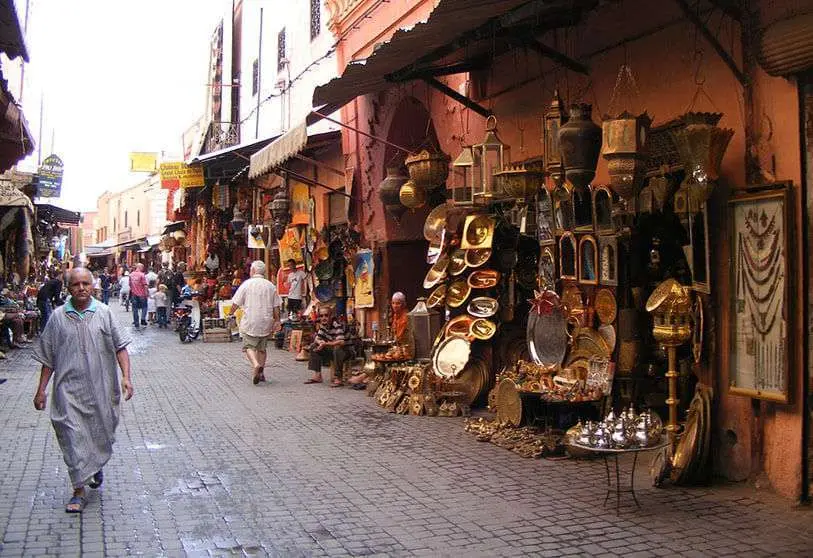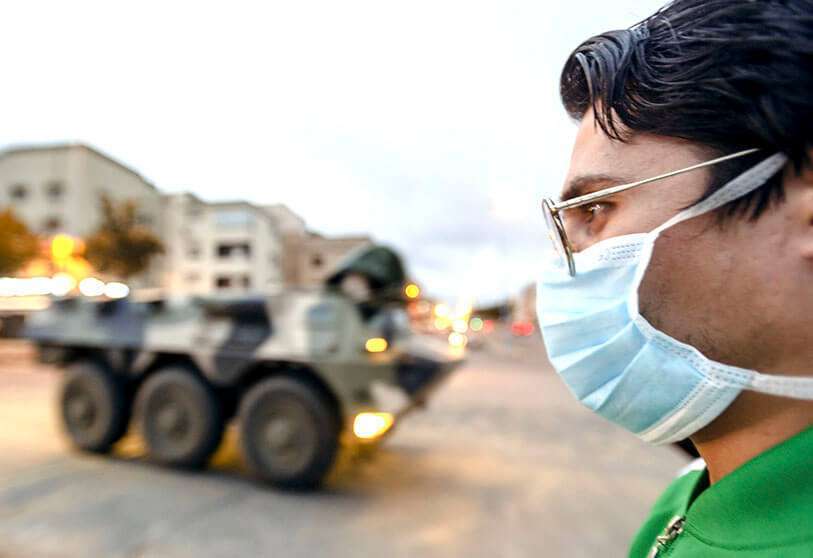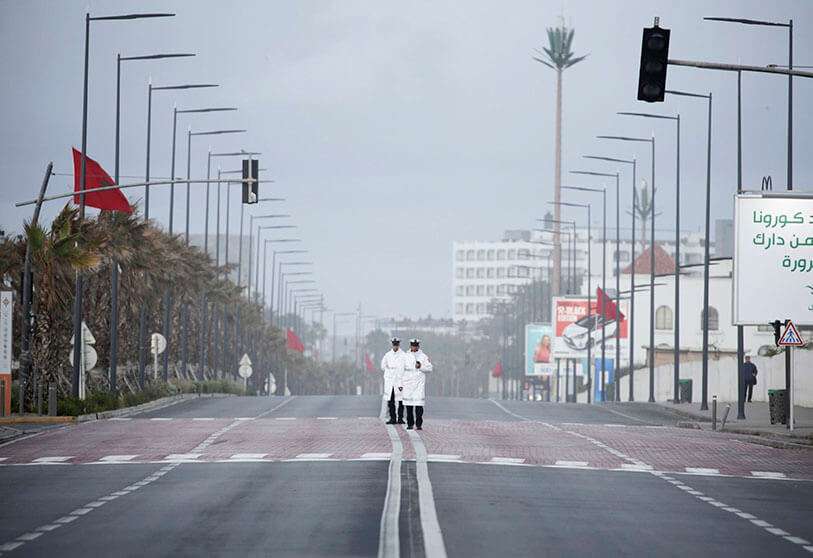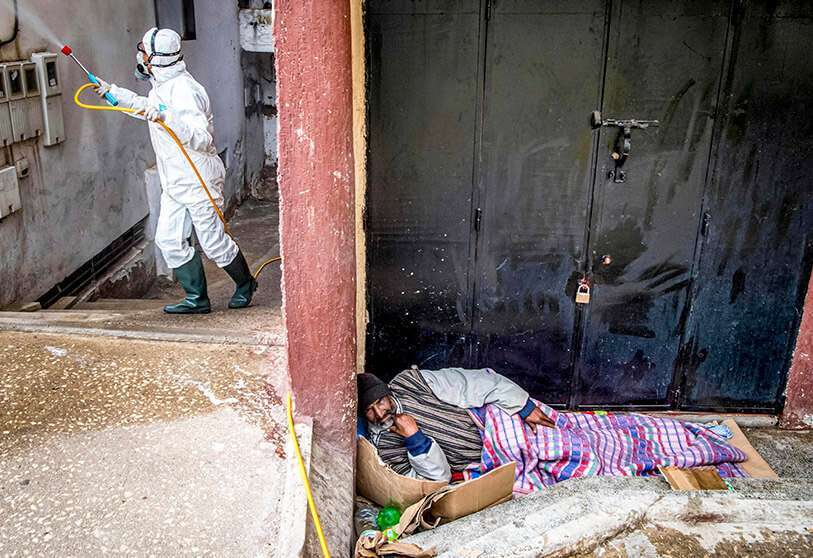El coronavirus paraliza la actividad empresarial marroquí

“The situation is very difficult for companies like mine, which have run out of customers very quickly. And a calamity for the Moroccan economy,” explains Atalayar Khalid Mouktafi, owner of a small company - like the vast majority of Moroccan companies - dedicated to car rentals in Rabat, by telephone. As in Mouktafi's case, 57% of Moroccan companies have stopped their activity as a consequence of the crisis of the COVID-19. This is the most outstanding data of the report prepared by High Commissioner for Planning (HCP), Morocco's official statistical agency, whose content was released on Wednesday. A figure that summarizes the consequences of the state of health emergency - which should end on May 20 - decreed as a result of the viral epidemic.
According to the estimates of the public entity, around 142,000 companies have temporarily or permanently suspended their activities (although 135,000 in the first case and 6,300 in the second). If we also consider that an important part of the Moroccan economy is developed in the informal sector - around 20% according to previous estimates by the Moroccan statistical organizations - and, therefore, is outside the study, the picture of the present moment can only be described as devastating.
According to its scale, it is the very small and small and medium sized companies that are worst off -using local terminology-: according to the work of the HCP -drawn up on the result of surveys of companies carried out between 1 and 3 April this year- 72% of companies that have had to cease trading are very small, while among those considered small and medium sized the percentage drops to 26%. Only 2% of the firms that have been forced to cease trading are large. It should be remembered that the very small and small and medium-sized enterprises as a whole account for 95% of the business fabric of our southern neighbors. According to the aforementioned state statistics agency, GDP should fall by 3.8% in the second quarter of the year compared to the first.
“The economic situation is quite delicate, we're having a lot of trouble covering our expenses. Everything the government has put in place is still insufficient to meet the growing demands of companies, which are having a lot of difficulties because of the sudden stop in activity. We have been in a very difficult situation for more than a month now and we are still not seeing the end of the tunnel,” Rachid Benkirane, a Rabat businessman from a small company in the international trade consultancy sector, told Atalayar.
Depending on the sector, the most affected is the hotel and catering industry. 89% of all companies in this sector have suspended their activity. In the case of companies in the textile and leather industry, 76% have had their work interrupted and the percentage falls slightly to 73% in the metal and mechanical industries. In the area of construction, 60% of firms have had to suspend their work according to the HCP report.

In addition, according to the study by the state statistical agency released on Wednesday, fishing, mining and agribusiness are the sectors least affected by the coronavirus crisis (with 24%, 32% and 34% of companies inactive, respectively).
On the other hand, among the companies that continue with their activity -that is, 43% of the total-, half of them have had to reduce to half their production to adapt to the crisis. Of these, 81% have had to reduce their production by up to half. This is especially the case for very small and small and medium-sized enterprises. 49% of these companies active during the state of emergency have been forced to reduce their activity.
For example, in the construction sector 62% of companies have been forced to reduce their activity. And the percentage drops to 60% in the case of companies active in the hotel and restaurant sectors. In the case of the chemical and parachemical industries that continue to operate despite the state of health emergency, 52% have dropped.
This is the case of the company in which Soumaya Naji, a professional in the real estate development sector, works, specifically a company dedicated to the development of a seaside resort in southern Morocco. The young resident of Rabat has seen how the works have been suspended as a result of the epidemic. “Everything has come to a complete halt, although in our case, for the time being, we are teleworking in the tendering of new projects. But we don't know what will happen in a few weeks' time,” Naji told this publication.
This is also the case of Khalid Mouktafi, owner of a small car rental company in the capital of Morocco. “My company's activity is almost completely stopped. After a foundation I was working with terminated the agreement we had, and I have a fleet of cars in Ben Guerir that I don't know how I'm going to pick up, I'm left with only one client,” he explains to Atalayar from Rabat. “And in the meantime, I have to face very high costs for insurance, office rent, internet and telephone. I am going to claim the 200 dirhams per month that the state offers to workers,” he admits to Atalayar.

“What is happening is terrible for Morocco's GDP. Because of the size and characteristics of our economy, we cannot afford to be in a situation like this for a long time. I agree with the Keynesian-type measures that the government is promoting to try to revive demand. We must have a patriotic attitude at this time and think of society as a whole and not of ourselves. It is important to safeguard social peace in a country as old and as rich as this one. I think that austerity in the long term is not good, even if, at this moment, it is up to each of us to be austere and resist,” Mouktafi says.
The crisis is also affecting Spanish businessmen who have settled in Morocco. This is the case of Violeta Caldrés from the Canary Islands, owner of a riad - a traditional guesthouse - Dar Arsama in the medina of Fez, which she acquired in 2013 and which, after years of hard work, they were able to open in 2017. "We are in a very tough situation. My husband and my two small children have been locked up at home for more than a month, a house in which we started living at the end of last year very close to the riad. The last tourists were some British people who left on March 14th and after the closing of the borders all the reservations we had were cancelled. Since then, nothing,” she explains to Atalayar.
“We have the uncertainty of not knowing when the sector will recover and, beyond that, what tourism will be like when all this happens. In addition to all this, there is the anxiety of not being able to leave or receive family members. I don't know when I will be able to see my family, who all live in Spain. We are powerless in the face of the situation,” laments the also artist and writer in a telephone conversation with this magazine from the heart of the Fes medina.
Other workers consulted express a reality that is quite different from that of smaller companies. This is the case of Fadoua Ouazzani, who works as a freelance digital designer for the Casablanca branch of a large French banking group. “In the case of my job, I still have the same contract and the same hours. I can't say anything has changed except that I'm working from home. Neither, fortunately, is my sector being affected in this crisis”.
“I do know that other colleagues in the bank who work in the commercial field, with customers in the offices, are being affected, but I can say that our company is functioning quite normally and that there has even been some recruitment. The bank is focused on developing telematics applications for its customers. And, yes, it' s true that in order to focus on this application it has temporarily abandoned other projects,” he explains.
Despite having kept her job, the young woman is living at home the hardest part of the crisis. Her father, who owns a well-known bookstore in Casablanca, is about to close down after a long period of time because of the health crisis: “The crisis in the book sector has been going on for a long time in Morocco and this situation is threatening the future of the business. In his case, he is being very affected”.

According to the study by the Moroccan statistical agency, 27% of companies have temporarily or permanently reduced their workforce, which means that 726,000 people have stopped working as a result of the coronavirus pandemic.
More than half of the workers affected by the economic crisis resulting from the pandemic - 57% to be precise - were employed in very small or small and medium-sized enterprises. The HCP's work shows that 245,000 professionals in the service sector - 17.5% of the total number of employees in this area - have stopped working. In the industrial sector, 195,000 jobs have disappeared as a result of the current crisis.
The statistical agency also notes that the percentage of affected workers in the clothing industry is 34%, higher than the percentage of employees in the hotel sector (31%), construction (27%) and catering (26%) who have stopped working.
The export firms are also having a hard time these weeks. 67% of these companies are being affected in different degrees. According to the HCP study, one company out of nine has permanently suspended its activity; 5 out of 9 have carried out a partial suspension and one third are still in a limited way, reports the weekly Jeune Afrique. A total of 133,000 jobs have been lost in all exporting companies, including all sectors.

For its part, the Confederation TPE-PME (which is the French acronym for very small and small and medium enterprises) has asked the Government to launch a credit line of 500,000 dirhams (the equivalent of 50,000 euros) aimed at these companies at interest rates of between 0 and 2% with a 100% guarantee backed by the Central Guarantee Fund (CCG), reported this Tuesday the newspaper L'Économiste.
In addition, the aforementioned business organization requests the Executive to postpone for 18 months and to pay without conditions all types of credit quotas to banks and other financial institutions. Finally, the organization calls for the reactivation and acceleration of micro-finance provided by the AMCs (Micro-Credit Associations) with credits that the Government has recently increased from 50,000 to 150,000 dirhams (5,000 to 15,000 euros) for very small (and self-employed) businesses.
In addition, the Central Bank of Morocco - Bank Al-Maghrib - lowered its benchmark interest rate from 2.25% to 2% last week. In short, companies are asking to be able to finance themselves at the same rate.
“This new line would allow very small and small businesses to finance themselves at a fairly competitive rate and solve their immediate difficulties,” says Benkirane. “The government has implemented a line, called Oxygen Financing, at 4% interest, which many companies will not be able to afford at this juncture,” the businessman told Atalayar from Rabat.
Meanwhile, the coronavirus pandemic is still ongoing in Morocco. At the time of writing, 3,537 infections and 151 deaths had been officially recorded in Morocco.








